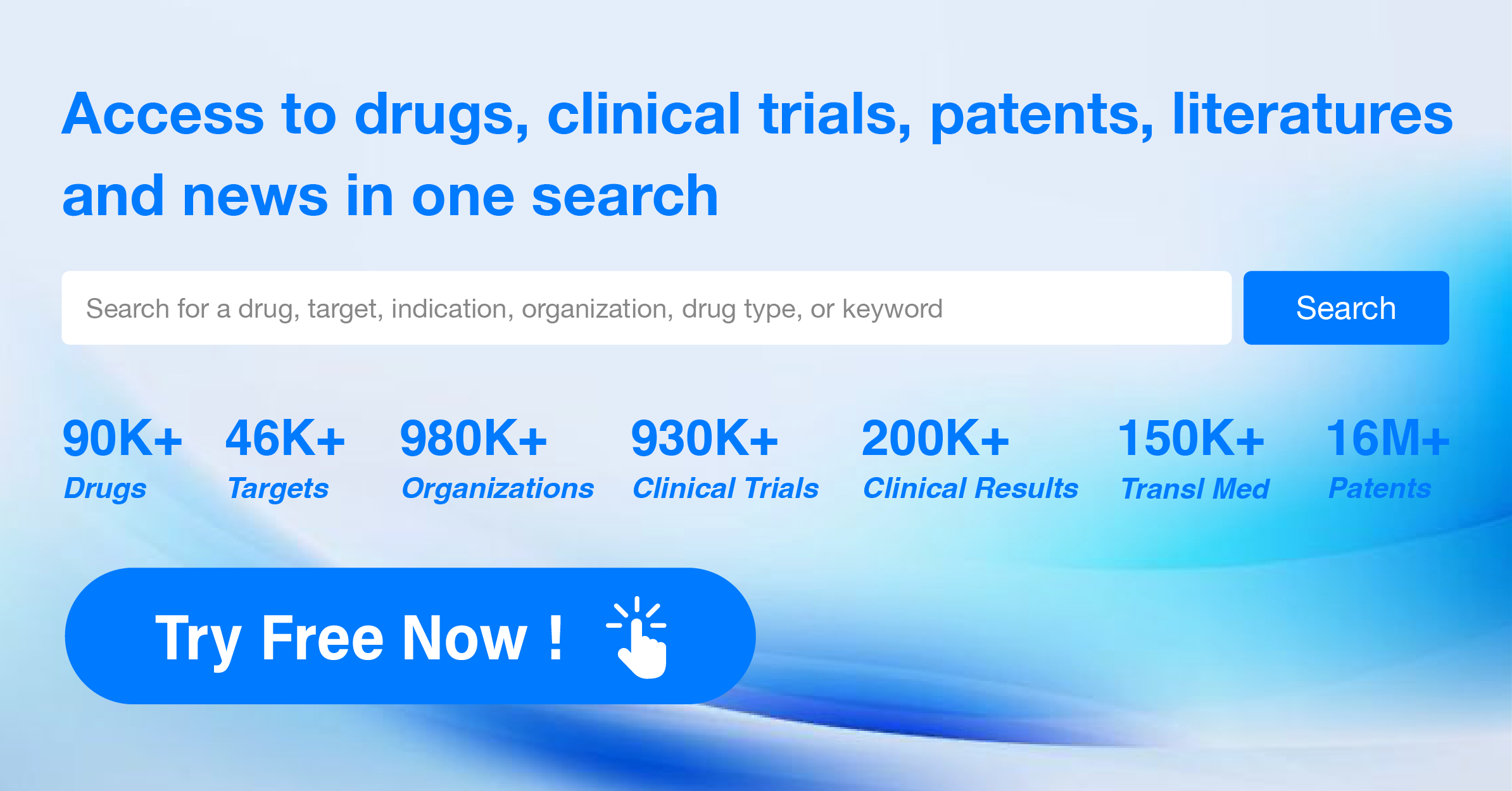Pharma Frontiers: Daily Digest of Global Pharmaceutical News – Jul 2
1.TauRx Pharmaceuticals Announces Submission of Marketing Authorization Application for Oral Tau Protein Targeting Therapy HMTM in the UK
On July 1, TauRx Pharmaceuticals announced the submission of a Marketing Authorization Application (MAA) in the United Kingdom for Hydromethylthionine Mesylate (HMTM), a tau aggregation inhibitor aimed at treating mild cognitive impairment (MCI-AD) and mild-to-moderate dementia caused by Alzheimer’s disease. HMTM has the potential to become the first oral anti-tau protein therapy for Alzheimer's disease. The application is based on recently published data from a 24-month Phase III clinical trial, LUCIDITY, and comprehensive data from two Phase III trials targeting early mild to moderate AD. These studies consistently demonstrated the benefits of HMTIL in reducing cognitive decline, maintaining normal daily living skills, and decreasing brain atrophy rates.
The LUCIDITY trial compared cognitive and functional outcomes, as well as changes in brain volume loss, among patients with early to moderate AD receiving 16mg of HMTM daily, over a 12-month period, compared to a control group. The trial then entered an open-label phase, where each patient received daily treatment with HMTM for the subsequent 12 months. Last year's published data on blood biomarkers showed that, compared to the control group, HMTM reduced the change in levels of neurofilament light chain (NfL) in the blood by 95% (p=0.0291). Blood levels of NfL are biomarkers for the progression of neurodegenerative brain damage.
The latest results showed that patients in the HMTM treatment group had significantly higher indicators at 18 months compared to baseline, and returned to baseline values after 24 months. Compared to the control group, the progression of disease symptoms to dementia stages was significantly reduced in the HMTM treatment group. Tau protein aggregation is closely associated with the rate and severity of cognitive decline, brain atrophy, and neuronal damage, which are hallmarks of neurodegeneration in the disease. HMTM functions by selectively inhibiting the aggregation of tau proteins in brain neurons. It also possesses a second mode of action: increasing the levels of acetylcholine in the hippocampus to enhance brain function.
2.Gloria Biosciences has introduced the CXCR4 antagonist motixafortide to the Hainan Boao region
On July 1st, Gloria Biosciences announced that its core product, the innovative CXCR4 antagonist motixafortide, has recently been approved by the Hainan Provincial Drug Administration. The drug has received an import license for clinically urgently needed pharmaceuticals, successfully landing in the Boao Lecheng Pilot Zone. Motixafortide was approved by the U.S. FDA in September 2023 as an innovative stem cell mobilizer for multiple myeloma (MM). Hematopoietic stem cell transplant is a therapeutic approach to reconstructing a patient's normal hematopoiesis and immune function, representing a critical treatment option for MM patients. Due to the extremely low content of hematopoietic stem cells in peripheral blood (blood outside the bone marrow), mobilization is mandatory to release hematopoietic stem cells from the bone marrow into peripheral blood to achieve an adequate white blood cell count and CD34+ cell count. The cells are then collected using blood cell separation technology. The development of induction therapy for multiple myeloma adversely affects stem cell products, thus placing higher demands on the efficiency of mobilizers. Furthermore, with the increasing number of older patients, guidelines recommend collecting stem cells twice in one go to prepare for a second transplant, necessitating more effective mobilizers that ensure patients obtain an optimal number of CD34+ cells to ensure smooth transplant procedures and favorable prognoses. Motixafortide is an innovative cyclic peptide CXCR4 antagonist administered via subcutaneous injection. It has a high affinity and binds to the CRCX4 receptor at six sites, with an action duration exceeding 72 hours, more efficiently mobilizing stem cells from the bone marrow to peripheral blood, and ultimately collecting the ideal number of stem cells needed for transplantation. In 2023, Gloria Biosciences reached a licensing agreement with BiolineRx, acquiring the right to develop, produce, and commercialize motixafortide for all indications in the Asian region.
3.Roche Announces Positive Regulatory Decision for New Generation Antibody Therapy Piasky
Recently, Roche has announced that the Committee for Medicinal Products for Human Use (CHMP) of the European Medicines Agency (EMA) has adopted a positive opinion on its new generation C5 recycling antibody, Piasky (crovalimab, also known as covelerlimab), for the treatment of Paroxysmal Nocturnal Hemoglobinuria (PNH). The CHMP recommends Piasky for adult and adolescent patients (aged 12 or above and weighing at least 40 kilograms) who are either treatment-naive or have previously received C5 inhibitor therapy. If approved, Piasky will become the first monthly subcutaneous (SC) injection therapy for PNH in the European Union, which patients can administer themselves after adequate training. This therapy could potentially serve as an alternative to regular intravenous infusions of C5 inhibitors, potentially reducing the burden and lifestyle disruption for PNH patients and their caregivers. PNH is a rare and life-threatening syndrome characterized by sudden episodes of hemoglobinuria, anemia, and thrombosis. Inhibition of complement C5 has become the standard treatment for PNH patients with significant clinical symptoms. However, the need for sustained, complete inhibition of the terminal complement pathway and high serum concentrations of C5 presents challenges in drug development, limiting patients to intravenous treatments. The CHMP's recommendation is mainly based on the results of the phase 3 COMMODORE 2 study, which involved patients who had not previously received C5 inhibitor treatment. The study demonstrated that PiaSky, administered once every four weeks by subcutaneous injection, showed good disease control and tolerability. The efficacy of Piasky was non-inferior to that of eculizumab, the existing standard therapy that requires bi-weekly intravenous injections. Adverse event rates in patients treated with Piasky were similar to those observed in patients receiving the active comparator drug (78% and 80%, respectively).
4.Hinova Pharmaceuticals Granted FDA Fast Track Designation for Protein Degradation Therapy
On June 30th, Hinova Pharmaceuticals announced that its investigational class 1 new drug, the protein degradation-targeting chimera HP518, has been granted Fast Track designation by the U.S. FDA for the treatment of androgen receptor (AR)-positive triple-negative breast cancer (TNBC). TNBC accounts for approximately 10% to 15% of all breast cancers and is characterized by high aggressiveness, high recurrence rates, and poor prognosis. AR-positive TNBC patients make up about 15% to 50% of all TNBC cases. AR regulates TNBC cell growth through a novel non-ligand-dependent mechanism, leading to suboptimal efficacy of AR inhibitors. According to a press release by Hinova Pharmaceuticals, HP518, as a highly active and selective AR-degrading protein-targeting chimera, can degrade AR and its mutants, thereby blocking the AR signaling pathway in TNBC. Preclinical pharmacology studies have shown that HP518 demonstrates significant anti-tumor activity and potential for combination with first-line drugs for TNBC. Safety pharmacology studies indicate that HP518 is well-tolerated at test doses, with no significant effects on the nervous, cardiovascular, and respiratory systems. In addition to TNBC, HP518 is also being developed for the treatment of metastatic castration-resistant prostate cancer (mCRPC). For the mCRPC indication, HP518 has completed Phase I clinical trials in Australia and has been approved by the FDA and China NMPA for clinical trials, with Phase I/II clinical studies currently enrolling in China.
5.Argo Biopharma's siRNA new drug has completed dosing for the first subject in Phase 1 clinical trials in China
On July 1, Argo Biopharma announced that the first participant in its Phase I clinical trial in China was dosed with BW-03 for chronic Hepatitis B (HBV) on June 27, 2024. BW-03 is an siRNA (small interfering RNA) drug independently developed by Argo Biopharma, intended for the treatment of chronic Hepatitis B. Prior to this, the drug had already completed enrollment of all participants in the global Phase I trials conducted in Australia, Hong Kong SAR of China, and Thailand. HBV infection is one of the world's most severe infectious disease threats, and chronic Hepatitis B is a major cause of liver disease. China is among the countries with a high prevalence of chronic Hepatitis B, and there is currently a lack of effective drugs to cure the condition. BW-03 is a novel siRNA drug developed by Argo Biopharma. Earlier, researchers had conducted a global Phase I clinical trial to evaluate the safety, tolerability, pharmacokinetics, and pharmacodynamics of single ascending doses in healthy participants and multiple dose administrations in patients with chronic Hepatitis B. By December 2023, the study in Australia had completed all health participant trials. Meanwhile, by May 2024, all patient enrollments in Thailand and Hong Kong SAR of China were completed, and in the same month, the trial received ethical committee approval to commence Phase I clinical trials in mainland China. Established in 2021, Argo Biopharma is a clinical-stage biotechnology company dedicated to developing a new generation of siRNA drugs to provide improved treatment options for patients worldwide. Over the past nearly three years, Argo Biopharma has built a rich and differentiated pipeline of siRNA drug candidates covering a wide range of indications including cardiovascular diseases, rare diseases, CNS disorders, viral infections, metabolic diseases, and more. Currently, Argo Biopharma has five siRNA drugs that have entered the clinical trial phase.
6.Huadong Medicine's Category 1 Biologic New Drug, HDM2005 for Injection, Receives FDA Approval for US IND
Recently, Hangzhou Zhongmeihuadong Pharmaceutical, a wholly owned subsidiary of Huadong Medicine, received a notification from the U.S. Food and Drug Administration (FDA) that their Investigational New Drug (IND) application for HDM2005 for injection has been approved. The company is now authorized to initiate Phase I clinical trials in the United States for the indication of advanced malignancies. HDM2005 for injection is a Category 1 biologic new drug, developed by Hangzhou Zhongmeihuadong with global intellectual property rights. It is an antibody-drug conjugate (ADC) targeting Receptor Tyrosine Kinase-Like Orphan Receptor 1 (ROR1). In May 2024, Zhongmeihuadong submitted the clinical trial application for the HDM2005 solution to the U.S. FDA and has recently received approval. Additionally, the clinical trials for the HDM2005 injection in China were approved by the National Medical Products Administration in June 2024, also for the indication of advanced malignancies. ROR1 is a typical oncofetal protein with tumor cell specificity, highly expressed in various solid tumors and hematological malignancies, making it a promising target for ADCs. ADCs are characterized by the high targeting capability of the antibody component and the potent cytotoxic activity of the linked toxin. HDM2005 has demonstrated promising anti-tumor activity and safety in preclinical studies, pharmacokinetics, and safety evaluations. The approval of this clinical trial for HDM2005 injection marks an important milestone in the product's development and further enhances the company’s core competitiveness in the ADC oncology therapy sector.
7.BMS and Materia End Global Collaboration on FRα ADC
On July 1, Materia announced that BMS, due to a prioritization of its internal product portfolio, will terminate the global strategic collaboration with Materia on the FRα ADC drug MORAb-202. Previously, in June 2021, BMS and Materia jointly announced a global development and commercialization collaboration agreement for the ADC drug MORAb-202 (Farletuzumab Ecteribulin), with the deal amounting to up to $3.1 billion. According to the terms of the agreement, Materia and BMS were to co-develop and commercialize MORAb-202 in regions including Japan, China, Asia-Pacific countries, the United States, Canada, Europe (including the EU and the UK), and Russia. BMS was responsible for developing and commercializing the drug in regions outside the collaboration areas, while Materia continued to handle global manufacturing and supply of MORAb-202. As per the terms, BMS was to pay Materia $650 million, of which $200 million was allocated for covering Materia’s research and development costs. Additionally, Materia was entitled to receive up to $2.45 billion in milestone payments. The partners were to share profits as well as research and development and commercialization costs within the collaborative regions, and Bristol Myers Squibb was to pay royalties for sales outside these regions. Materia expected to market MORAb-202 in Japan, China, Asia-Pacific countries, Europe, and Russia, while BMS would handle sales in the USA and Canada. Following the termination of this collaboration, Materia will proceed independently with the global development and commercialization of MORAb-202, reimburse BMS for the unused portion of the $200 million in research and development funds, and recognize the remaining amount as other income. MORAb-202 is Materia's first ADC, utilizing an internally developed anti-folate receptor α (FRα) antibody linked to Materia's anticancer agent eribulin through a cleavable linker. This candidate drug is potentially the best-in-class targeted FRα ADC, exhibiting favorable pharmacological characteristics and demonstrating single-agent activity in patients with advanced solid tumors.
How to obtain the latest research advancements in the field of biopharmaceuticals?
In the Synapse database, you can keep abreast of the latest research and development advances in drugs, targets, indications, organizations, etc., anywhere and anytime, on a daily or weekly basis. Click on the image below to embark on a brand new journey of drug discovery!




